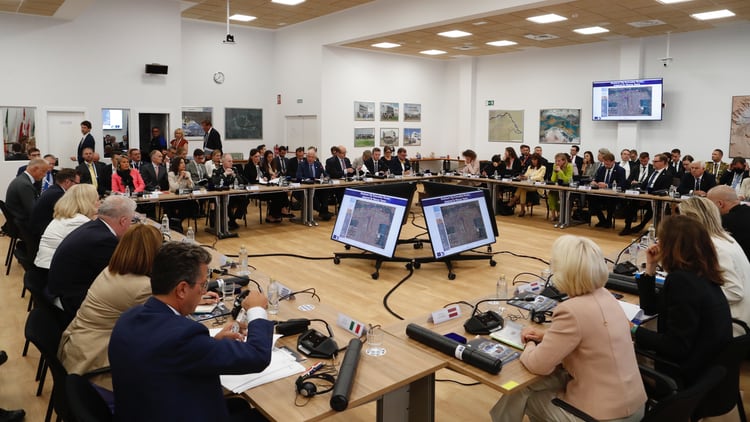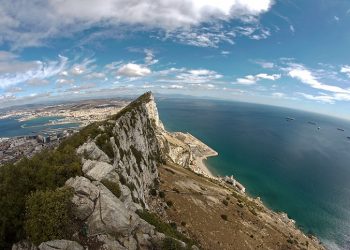The Diplomat
The war in Ukraine and the situation in the Sahel, following the recent coup d’état in Niger, will be the focus of discussions at the informal meetings of EU foreign and defence ministers, which are being held today and tomorrow in Toledo.
Yesterday, as host because Spain holds the Presidency of the EU for this six-month period, the Minister of Defence, Margarita Robles, welcomed her European colleagues, who visited Toledo, attended a concert in the cathedral and then took part in a working dinner.
Previously, the ministers, together with the High Representative for Foreign Affairs and Security Policy, Josep Borrell, took part in the meeting of the Ministerial Steering Board of the European Union Satellite Centre (EU SATCEN), at the Torrejón de Ardoz Air Base.
At the joint press conference afterwards, Minister Robles expressed the support of all the EU defence ministers and the Spanish government for Borrell in the face of Russia’s insults and threats. “We cannot accept it, by insulting the High Representative they are insulting all EU citizens,” said Robles.
“The whole EU is supporting Ukraine and we will continue to do so, because by supporting Ukraine we are supporting the values of peace, freedom and democracy,” stressed the minister, who took advantage of yesterday’s meeting to meet her Estonian counterpart, Hanno Pevkur. Both highlighted the excellent cooperation established on the occasion of the deployment of Spanish forces in Estonia as part of NATO’s eastern flank arrangements.
The actual sessions of the meeting will take place today at the Fábrica de Armas in Toledo, and in the evening a joint dinner is scheduled with the foreign affairs ministers, who have scheduled their informal meeting (Gymnich) for tomorrow, Thursday, in the same venue.
On both days, the main issues to be discussed are support for Ukraine in the face of Russian aggression and the delicate situation in Niger, following the coup d’état staged on 26 July by General Abdourahmane Tchiani to overthrow President Mohamed Bazoum.
The two meetings and the joint dinner will be attended by the EU High Representative for Foreign Affairs and Security Policy, and the Ukrainian Defence Minister Oleksii Reznikov and Foreign Minister Dmitro Kuleba have been invited.
His Ukrainian counterpart, Oleksii Reznikov, has been invited to today’s meeting of the defence ministers, and the Ukrainian foreign minister, Dmitro Kuleba, has been invited to tomorrow’s meeting.
There will be no official decisions, as these are informal meetings, but it is possible that some political agreements may be reached.
With regard to Ukraine, the defence ministers, together with UN and NATO officials, will analyse the global and regional impact of the war, and tomorrow the foreign ministers will extend the discussion to the Ukrainian formula for peace.
At their last Council meeting in July, EU foreign ministers began discussing what kind of long-term security commitments they could adopt for Ukraine.
One option put forward by Borrell is to increase the European Peace Facility (EPF), through which member states co-finance the delivery of lethal and non-lethal equipment to Ukraine, by an additional 5 billion euros per year for four years.
Meanwhile, Denmark and the Netherlands lead the coalition of eleven NATO countries that have pledged to help Ukraine acquire F-16 fighter jets, after the US, which manufactures them, gave the go-ahead. Before that, Ukrainian pilots will need to be trained to operate the aircraft.
As for possible negotiations to end the war, the EU has made it clear that it is up to the Ukrainian authorities to determine the timing and conditions.
Coup d’état in Niger
The other major issue to be discussed by both EU defence and foreign ministers is the situation in Niger following the coup d’état by the self-styled National Council for the Safeguarding of the Homeland (CNSP), which announced the ousting of President Bazoum, and the suspension of the constitution.
The EU has reiterated its support for the democratically elected Bazoum, who has been under house arrest since the coup.
It also expressed its full support for the measures and sanctions being taken by the Economic Community of West African States (Ecowas) against the coup plotters in Niger, which has become the fourth country in the region to be led by a military junta.
The EU has also called the decision to expel the French ambassador – who maintains some 1,500 troops in Niger – by authorities it “does not and will not recognise” a “new provocation”.
Ecowas has decreed tough economic sanctions against Niger and threatens military action against the coup plotters if they refuse to re-establish constitutional order, an intervention that France advocates.






